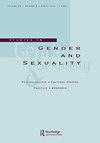Apophenic Reading and the Politics of Psychoanalysis
Q3 Social Sciences
引用次数: 0
Abstract
ABSTRACT Psychoanalysis provides a framework for understanding how phenomena like parapraxes, fantasies, and dreams are indices of unconscious processes. In this way it is a particularly suspicious undertaking, linking surface clues to what, by definition, cannot be known. This essay attends to the suspicious and skeptical registers of psychoanalysis to sense a resonance between what is made visible and invisible in the making of “nation” and “human.” There is a secret history of psychoanalysis, in which it is bound up with political agitation, socialist movements, and skepticism of human exceptionalism. What about the suspicious method of psychoanalysis is threatening not only to psychic but to political repression? By tarrying in this secret history, and the strange, symptomatic ambivalences in psychoanalytic texts, this article suggests that the politically serviceable roots of psychoanalysis could be returned from their repression in the present day, to answer to contemporary abolitionist projects.幻读与精神分析的政治
摘要:心理分析提供了一个框架来理解像副行为、幻想和梦这样的现象是如何成为无意识过程的指标的。这样一来,这是一项特别可疑的工作,将表面线索与定义上未知的东西联系起来。本文关注精神分析的可疑和怀疑的领域,以感受在“国家”和“人类”的形成过程中有形和无形的东西之间的共鸣。精神分析有一段秘密的历史,在这段历史中,它与政治骚动、社会主义运动和对人类例外论的怀疑联系在一起。精神分析的可疑方法不仅威胁到精神,而且威胁到政治镇压,那该怎么办?通过停留在这段秘密的历史中,以及精神分析文本中奇怪的、有症状的矛盾心理,这篇文章表明,精神分析的政治有用的根源可以从当今的镇压中回归,以回应当代废奴主义的项目。
本文章由计算机程序翻译,如有差异,请以英文原文为准。
求助全文
约1分钟内获得全文
求助全文
来源期刊

Studies in Gender and Sexuality
Social Sciences-Gender Studies
CiteScore
0.80
自引率
0.00%
发文量
15
期刊介绍:
Beginning in the final two decades of the 20th century, the study of gender and sexuality has been revived from a variety of directions: the traditions of feminist scholarship, postclassical and postmodern psychoanalytic theory, developmental research, and cultural studies have all contributed to renewed fascination with those powerfully formative aspects of subjectivity that fall within the rubric of "gender" and "sexuality." Clinicians, for their part, have returned to gender and sexuality with heightened sensitivity to the role of these constructs in the treatment situation, including the richly variegated ways in which assumptions about gender and sexuality enter into our understandings of "normality" and "pathology."
 求助内容:
求助内容: 应助结果提醒方式:
应助结果提醒方式:


